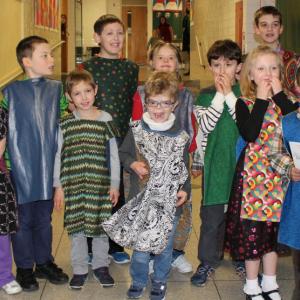Why is musical theater such a powerful medium through which children and adults find pleasure and a desire to engage in? Does musical theater experience help children with special needs develop socioemotional skills? Sandra Russ, the Louis D. Beaumont Professor of Psychology and Olena Zyga, Graduate Student in Clinical Psychology, from Case Western Reserve University collaborated with Heather Meeker, Executive Director, and Jodi Kirk, Curriculum Writer and Teaching Artist, for The Musical Theater Project, to gather empirical evidence of the effectiveness of a 4-week musical theater residency program, entitled Kids Love Musicals! The program was delivered to children with special needs at schools across northeast Ohio. Both parties involved hoped to better understand if engaging in the residency program, which targets teaching social skills and emotional understanding through learning the Wizard of OZ, impacted participant’s socioemotional skills related to making eye contact, engaging with others, taking turns appropriately, and showing emotional understanding. A second aim related to understanding if gains seen during the residency program extended to other environments.
Meeker, Kirk, and Zyga presented the findings of the research project at both Milestones, a conference on Autism, in Cleveland OH in June 2015 and also at VSA Intersections, an arts and special education conference hosted by the Kennedy Center for the Arts, in Washington DC in August 2015. Updated results from the project will be presented again at Milestones in June 2016 and also at OCALICON, an autism and disabilities conference, in November 2016.
Since this partnership began in the Fall of 2014, research findings show that:
- Students who participated in the residency program did make gains in eye contact, turn taking, engagement, and symbolic flexibility, or the ability think more flexibly about characters and use their imaginations, from the start to the end of the program period.
- Findings on certain variables, such as emotional understanding and social awareness, related to school site, meaning that the severity of a child’s disability impacts the amount of gains they make in the program. This suggests that tailoring the program for different ability levels may make it even more effective in increasing socioemotional functioning.
- From teacher reports, gains from pre to post-residency were seen in variables relating to students being more willing to engage with others in the classroom and being more able to work with other students in group settings. Significant gains were also seen in participants’ ability to display/maintain appropriate eye contact and to take turns with other students or teachers in a school setting. These findings suggest that a generalization of gains in socioemotional skills relating to engagement, turn taking, and eye contact may be occurring to settings outside of the residency program.
- Stay tuned! Analysis on how the curriculum impacts gains being made during the residency program are currently underway…


